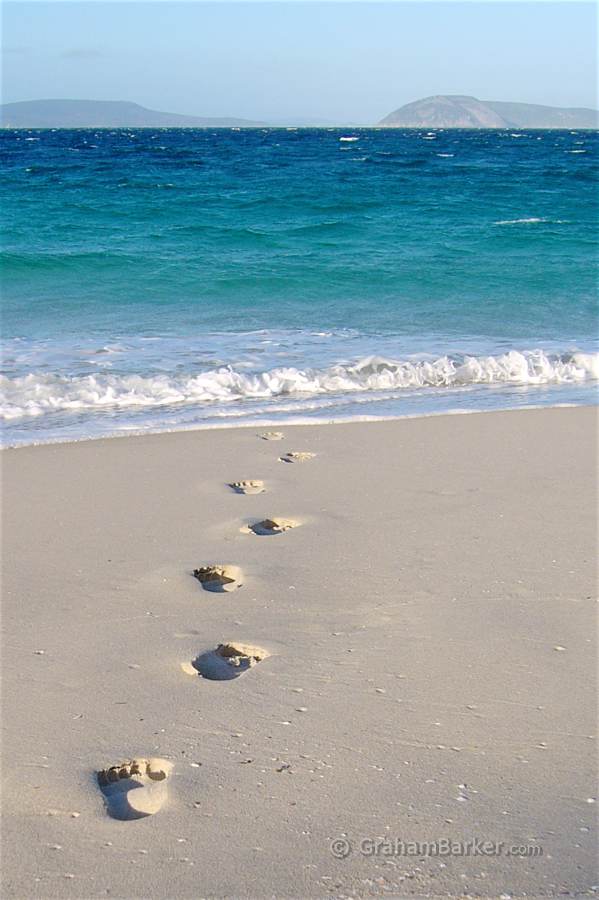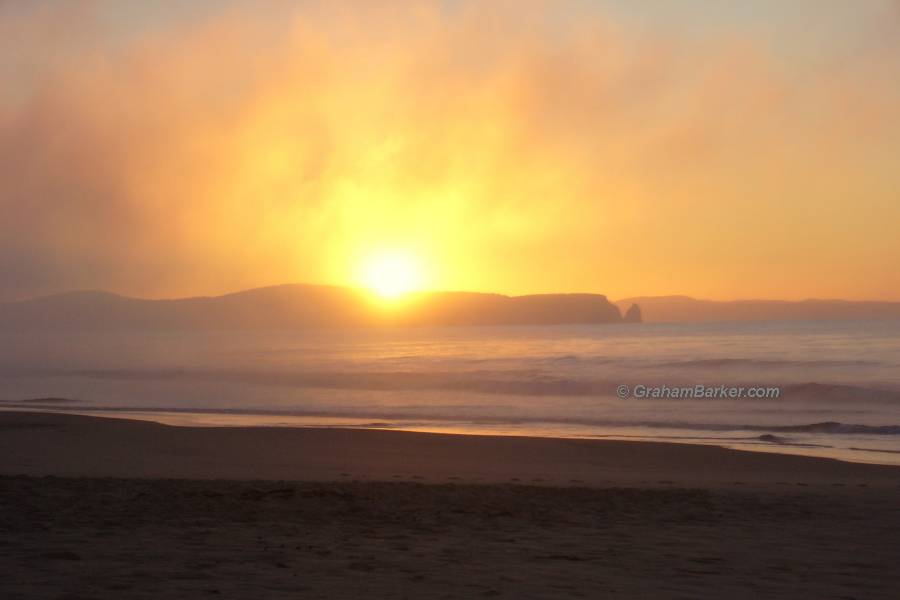Winter travel in Australia and New Zealand
Some advantages of travelling down under in the winter off-season
Many people find it strange that I prefer to travel, hike and camp in winter, especially when I seek out places colder than where I live, not warmer. Partly it's because I prefer cooler weather, but there are many other clear advantages of travelling down under in the winter off-season. On this page I list some of them.
Firstly, some exclusions. These observations apply to the temperate areas of Australia, plus New Zealand, in places where winter is the off-season. What follows does not apply to the tropics, central deserts and the ski resorts, where winter is popular for climatic reasons. Also, some of the off-season benefits do not apply during the mid-year school holidays in July.
Here then are the advantages of winter travel in Australia and New Zealand, based on my own experiences over many years.

A half price rental campervan and scenic roads with no traffic contribute to a great road trip
Winter touring in general
- Cheaper airfares, greater availability of seats. Getting your first choice of dates and times, and finding discount fares, is much easier in winter than in the popular holiday periods when it seems everyone is wanting to travel at once. This can also apply to bus and train travel too.
- Good deals on accommodation. Outside of ski resorts, winter in cooler areas can lead to low-season bargains. I've sometimes paid less than half price, as owners would rather receive low rates than see a room remain empty.
- Discounts on car hire - as with accommodation, I've been blessed with bargain rates in winter, especially with campervans.
- Less traffic on scenic roads, making driving more pleasant and relaxing.
- Flexibility - fewer things need to be booked ahead in winter, making it easier to be spontaneous, vary plans to suit the weather, and linger in favourite places.
- Taking leave from many jobs can be easier in winter, with fewer other staff competing for time off.
- Peace and quiet. If you want a beach all to yourself with no other footprints on it, or you want to enjoy the sounds of a waterfall without it being drowned out by busloads of noisy tourists, then winter is your best chance.
- Reality. The winter off-season is often the best time to experience the true character and ambience of a place, not when it is invaded by peak season crowds. Locals are sometimes friendlier to visitors when not overwhelmed by their numbers.
- Later sunrises - those who like photographing sunrises, or using the early morning light, will appreciate not having to get up so early to do this in winter.
- Beaches - the enjoyment of a beach often has more to do with the day's weather than the time of year. While the water may get a little chilly for swimming in southern parts, beaches in winter lack the scorching sand, flies, and sunburn risk present in the hot months. If you get a mild sunny day with little wind, time on a beach in winter can be surprisingly pleasant.

Misery Beach, Albany, WA
The natural environment is what really sets Australia and New Zealand apart from other places. I love exploring it by hiking, and sometimes camping, and have enjoyed these winter advantages:
Winter hiking
- Fewer flies and mosquitoes. Hordes of bush flies and march flies can spoil a walk in the warmer months, but they are refreshingly absent in winter. Even NZ sand flies can be less of a nuisance.
- Temperatures more conducive to outdoor exercise - body temperature is easier to regulate by adding or removing layers of clothes.
- Less perspiration. This means less risk of dehydration, less drinking water required, and clothes get less smelly.
- Drinking water more readily available - creeks that dry up in summer are wetter and fresher in winter. Less drinking water needs to be carried.
- Snakes in Australia are relatively inactive, making winter much safer for hiking than summer. This especially applies to solo walkers, whose quieter approach means they generally encounter more snakes than people in groups. It doesn't apply to New Zealand where there are no snakes.
- Fewer people. In many places the wilderness tracks can be packed out in spring or summer, particularly in the school holidays. This can destroy the feelings of remoteness, solitude, peace and quiet that make such areas attractive in the first place.
- Less pollen and dust. Spring can be an unpleasant time for hay fever sufferers, and dust can be an irritation to eyes and noses in summer in dry areas. In contrast, winter air is cleaner and kinder to sensitive noses.

Sunrise through sea mist on Bruny Island ... and I didn't have to get up early to see it
Winter camping
- Less competition for the best campsites, both in the bush and in campgrounds.
- Tent cooler in daytime. In summer the sun can quickly heat up the inside of a tent (or van) from an early hour, making it feel like an oven, and restricting its daytime use. In cold weather this is not a problem.
- Natural refrigeration - milk and perishable foods are less likely to go off in colder weather.
Not many go snow-camping in this part of the world, which is not surprising given the limited opportunities. But if you do, camping on snow has some advantages:
- A level smooth tent site is easier to obtain - with a bit of digging, bumps can be removed, and even a moderate slope can be levelled if the snow is deep enough.
- Abundant clean water close by - when melting snow for water, any campsite on snow is close to a plentiful supply. It is also less likely to be contaminated than creek water.
- Human waste disposal - in fragile wilderness areas the most environment-friendly practice is to carry it out. In warm weather this could be unappealing, but in cold conditions the storage and transport of poo is more user-friendly.
Disadvantages
To be fair, winter travel has aspects that don't suit everybody.
- Cold weather - although this can be dealt with easily enough with warm clothing, it is not to everyone's taste.
- Slippery roads - wet gravel roads, and ice or snow on any surface, can be hazardous. This affects only limited parts of Australia and New Zealand. Although road conditions need not interfere too much with a winter driving holiday, it can limit some options.
- Shorter daylight hours - this can limit outdoor activity, although in the latitudes of Australia and NZ the daylight hours aren't as short as in Europe or North America in winter. Getting an early start goes a long way towards getting around this, as does travelling in late winter (August) rather than in June when daylight is at its minimum.
- Closures - some tourist attractions close or reduce their hours in the off-season, and some trips may not run as frequently. Snow can close roads in some limited areas, although usually not for long.
Despite some disadvantages, I hope you can see why exploring New Zealand and the temperate parts of Australia in winter appeals to many people. Next time you see someone working through the warm months then venturing into the great outdoors when the weather turns cold and inclement, just remember we are not mad, just different ... and there is some reasoning behind our choices.




